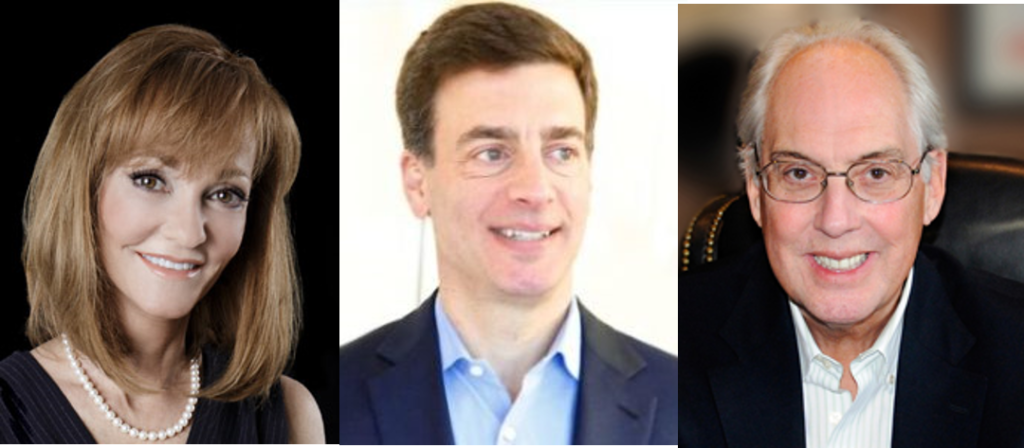 It always amazes to me scan radio publications and read about how much money the industry’s CEOs make. In some cases, these are the lead stories that we see in our email boxes, thanks to the Security and Exchange Commission’s disclosure rules that require publicly traded to submit this information about how much their corporate officers earn.
It always amazes to me scan radio publications and read about how much money the industry’s CEOs make. In some cases, these are the lead stories that we see in our email boxes, thanks to the Security and Exchange Commission’s disclosure rules that require publicly traded to submit this information about how much their corporate officers earn.
But when you think about who’s running your company – or the ones you compete against – do your really care about Caroline Beasley’s annual salary, David Field’s stock options, or Ed Christian’s bonus plan?
In the big picture of radio, this is really petty and personal stuff – no more meaningful or than discussing whether LeBron James is worth his salary on sports talk radio stations. It’s frivolous, superficial, and does nothing to advance the industry and its mission to remain relevant and impactful.
What we should be thinking about and focusing on is their leadership skills, their vision, and their spirit of innovation. How are they navigating their companies to remain competitive and future-focused? What is their vision and how will they get there. How will they steer their companies in both the short and long runs to remain successful?
And when you look beyond radio, these are the same traits that drive board decisions about the people running the companies they represent. In fact, the topic of CEO effectiveness has never been more important to the success of business than it is today. Chances are, you may know the names of many corporate leaders of major companies around the U.S. and the world.
of major companies around the U.S. and the world.
Amazon’s Jeff Bezos, Starbucks’ Howard Schultz, and GM’s Mary Barra are just a few of the CEOs that have become household names. Cable outlets like CNBC and Fox Business News have elevated their presence in news headlines, not to mention the narratives that drive their companies.
In many ways, radio has followed suit. Aside from compensation information, the direction of many industry trade stories – every single day – is reporting on CEO decision-making, speculation, partnerships, and the usual hiring and firing.
A recent story in Marketing Daily by Tanya Gazdik suggests that CEO likeability is a real factor – often driving brand loyalty, interaction with employees and customers. She quotes a new National Likeability Study by Owler, culling thousands of CEO reviews to create its ranking. At the top are Costco’s Craig Jelinek (Costco), Marriott’s Arne Sorenson, and Capital One’s Richard Fairbank.
At the bottom – Yahoo’s Marissa Mayer and United’s Oscar Munoz, both of whom have suffered through lots of bad press – maybe for good reason.
Uber’s troubled CEO, Travis Kalanick, stepped down yesterday amid scandals surrounding the company. He placed well out of the top 100 in these Owler rankings.
It is also interesting to note that since the survey was published, two prominent CEOs – Mark Fields (Ford) and Jeffrey Immelt (GE) have both been given their walking papers. Interestingly, neither places especially well on the Owler rankings.
(BTW a number of broadcast radio CEOs show up in this study. I’ll let you search them on your own.)
The Owler team believes this notion of CEO likeability goes well beyond a popularity contest – that corporate leaders who are responsive to employees through simple gestures like penning personal notes, writing website messages, or being active in the social sphere can be difference-makers in this fast-shifting business environment.
Maybe this idea of likeability has resonance, but it seems like there are more important variables we should be taking into account when discussing the success of radio’s key companies. Yes, how CEOs connect with customers on the one hand and employees on the other has never been more important in predicting success. But so are their leadership abilities, their vision, and their ability to communicate it to their staffs. .
So perhaps instead of fixating on compensation, we should be looking at less tangible but ultimately more important qualities from the people who run radio companies.
Here are 10 of them to consider:
- Their ability to effectively lead in both good quarters and bad ones
- Setting a tone that is both confident and credible
- Engendering and encouraging innovation and risk-taking throughout the organization
- Having an eye on the future and hiring the right people to get there
- Taking a genuine interest in their people
- Inspiring their employees at all levels
- Serving the radio broadcasting industry, above and beyond running their companies
- Making a commit to public service corporately and in their respective markets
- Mentoring young people and recruiting them to the industry
- Connecting with leaders in other key fields that directly impact radio’s future
For many of the corporate execs who have run afoul or who have been shown the door, it often revolves around a shortage of some of these skills. And in thinking about these qualities, CEOs who can deftly pull them off are worth whatever they’re paid.
It’s never been about how much money is in their 401Ks or their stock bonus plans.
As many of them are fond of saying, at the end of the day, it’s about their effectiveness, their vision, and their leadership.
- What To Do If Your Radio Station Goes Through A Midlife Crisis - April 25, 2025
- A 2020 Lesson?It Could All Be Gone In A Flash - April 24, 2025
- How AI Can Give Radio Personalities More…PERSONALITY - April 23, 2025




Fred, it’s not lost on me that most of this list points directly to the people skills of a CEO. The tone of their messages, both good and bad, make a huge difference to their people, enabling them to spread these traits throughout the company. The CEO’s genuine interest in their most important resource can either support or dampen things like risk taking and feeling inspired to do great work. Great employers commit to an environment that encourages employees to challenge themselves to do everything possible to become an indispensable team member.
Absolutely, Keith. This focus on compensation is misplaced, gossipy, and off-point. It’s about what these people bring to their companies and how they lead. Thanks for the comment.
I agree – if they’re doing a lousy job, a fraction of what they get paid is too much. If they’re doing well, no amount of money is enough. But very little of your list applies to any radio CEO and many are all but immune from being fired. To wit, all three of the people you pictured are there either because they founded the company or their father did.
Radio has seen very little in the way of innovation, with one exception and that’s cost cutting. Radio has has suffered from a lack of direction and leadership for a long time and that starts at the top. I can’t recall one meaningful project or initiative on anything close to a macro level in over 20 years. Inspiration, mentoring, public service and innovation are, for the most part, in short supply, so IMO, whatever the details, most radio CEOs make way too much.
I’m not interested in getting into a discussion about individual radio CEOs – good, bad, or otherwise. But I think in the cases you mention, the companies are even stronger with “the kids” running them. In Saga’s case, Ed Christian would be happy to tell you – or lecture you – that he inherited nothing – he built Saga without any help from parents.
We have different vantage points. From our CES/CEO Tour to work that I’m engaged in right now with a group of inspirational radio CEOs, I’m seeing a side that many in the industry don’t get to see. By and large, there’s an emerging new group of leaders in broadcast radio. They all have aggressive agendas and major challenges. In the main, I’m seeing strong signs of progress, and yes, innovation.
I appreciate the dialogue, as always.